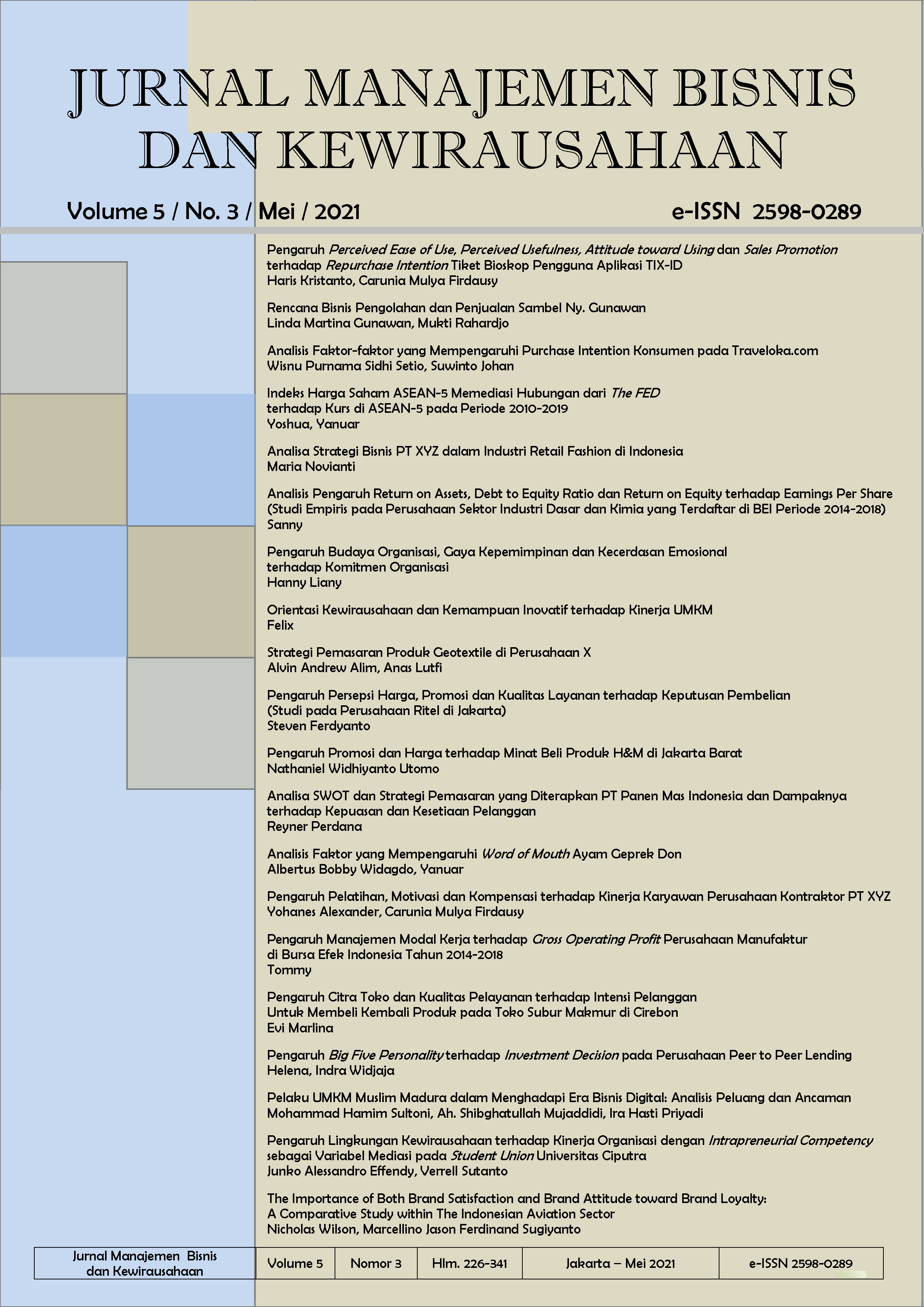Pengaruh Budaya Organisasi, Gaya Kepemimpinan dan Kecerdasan Emosional terhadap Komitmen Organisasi
Main Article Content
Abstract
The purpose of this research is to examine whether there is an influence between 1) organizational culture 2) leadership style 3) emotional intelligence 4) organizational culture, leadership style and emotional intelligence simultaneously to organizational commitment. Sample was selected using probability sampling method amounted to 129 respondents at Yontomo Sukses Abadi Corporate based in Tangerang. Data processing techniques using classical assumption testing and multiple linear analysis assisted by SPSS program version 25. The result of this study shows that 1) Organizational culture has a significant effect on organizational commitment 2) Leadership Style has a significant effect on organizational commitment 3) Emotional intelligence does not have a significant effect on organizational commitment 4) Organizational Culture, leadership style and emotional intelligence simultaneously influence organizational commitment.
Tujuan dari penelitian ini adalah untuk menguji apakah terdapat pengaruh antara 1) Budaya Organisasi 2) Gaya Kepemimpinan 3) Kecerdasan Emosional 4) Budaya Organisasi, Gaya Kepemimpinan dan Kecerdasan Emosional secara simultan terhadap komitmen organisasi. Sampel dipilih menggunakan metode probability sampling, sampling berjumlah 129 responden di PT Yontomo Sukses Abadi Tangerang. Teknik pengolahan data menggunakan pengujian asumsi klasik dan analisis linear berganda yang dibantu dengan program SPSS versi 25. Hasil penelitian ini menunjukan bahwa 1) Budaya organisasi berpengaruh secara signifikan terhadap komitmen organisasi 2) Gaya Kepemimpinan berpengaruh secara signifikan terhadap komitmen organisasi 3) Kecerdasan emosional tidak berpengaruh signifikan terhadap komitmen organisasi 4) Budaya Organisasi, Gaya kepemimpinan dan kecerdasan emosional secara simultan berpengaruh terhadap komitmen organisasi.
Article Details
Section
This work is licensed under a Jurnal Manajemen Bisnis dan Kewirausahaan Creative Commons Attribution-ShareAlike 4.0 International License.
How to Cite
References
Al-Sada, M., Al-Esmael, B. & Faisal, M. (2017). Influence of organizational culture and leadership style on employee satisfaction, commitment and motivation in the educational sector in Qatar. EuroMed Journal of Business, 12(2), 163-188.
Dasborough, M. (2019). Emotional intelligence as a moderator of emotional responses to leadership. Emotions and Leadership (Research on Emotion in Organizations, 15), Emerald Publishing Limited, 69-88.
Ghozali, I. (2011). Aplikasi Analisis Multivariate dengan Program SPSS. Semarang: Badan Penerbit Universitas Diponegoro.
Huey Yiing, L. & Zaman Bin Ahmad, K. (2009). The moderating effects of organizational culture on the relationships between leadership behaviour and organizational commitment and between organizational commitment and job satisfaction and performance. Leadership & Organization Development Journal, 30(1), 53-86.
Islam, T., Tariq, J., & Usman, B. (2018). Transformational leadership and four-dimensional commitment: Mediating role of job characteristics and moderating role of participative and directive leadership styles. Journal of Management Development, 37(9/10), 666-683.
Keskes, I., Sallan, J. M., Simo, P., & Fernandez, V. (2018). Transformational leadership and organizational commitment: Mediating role of leader-member exchange. Journal of Management Development, 37(3), 271-284.
Khalid, J., Khaleel, M., Ali, A., & Islam, M. (2018). Multiple dimensions of emotional intelligence and their impacts on organizational commitment and job performance. International Journal of Ethics and Systems, 34(2), 221-232.
Kohlmeyer III, J. M., Mahenthiran, S., Parker, R. J., & Sincich, T. (2014). Leadership, budget participation, budgetary fairness, and organizational commitment. Advances in Accounting Behavioral Research. Published online: 07 Oct 2014; 95-118.
Lam, C. S., Eleanor, R. E., & O'Higgins. (2012). Enhancing employee outcomes: The interrelated influences of managers' emotional intelligence and leadership style. Leadership & Organization Development Journal, 33(2), 149-174.
Larasati, S. (2018). Manajemen Sumber Daya Manusia. Yogyakarta: Deepublish
Limpanitgul, T., Boonchoo, P., Kulviseachana, S., & Photiyarach, S. (2017). The relationship between empowerment and the three-component model of organisational commitment: an empirical study of Thai employees working in Thai and American airlines. International Journal of Culture, Tourism and Hospitality Research, 11(2), 227-242.
Malhotra, N. K. (2010). Marketing Research: An Applied Orientation. Boston: Pearson.
Marnis, P. (2008). Manajemen Sumber Daya Manusia. Sidoarjo: Zifatama Publisher.
Mesu, J., Sanders, K., & Riemsdijk, M. (2015). Transformational leadership and organisational commitment in manufacturing and service small to medium-sized enterprises: The moderating effects of directive and participative leadership. Personnel Review, 44(6), 970-990.
Mwesigwa, R., Tusiime, I., & Ssekiziyivu, B. (2020). Leadership styles, job satisfaction and organizational commitment among academic staff in public universities. Journal of Management Development, 39(2), 253-268.
Naderi Anari, N. (2012). Teachers: emotional intelligence, job satisfaction, and organizational commitment. Journal of Workplace Learning, 24(4), 256-269.
Raharjo, K., Nurjannah, Solimun, & Fernandes, A. A. J. (2018). The influence of organizational culture and job design on job commitment and human resource performance. Journal of Organizational Change Management, 31(7), 1346-1367.
Rahman, S., Islam, M. Z., Abdullah, A. D. A., Sumardi, W. A. (2018). Empirical investigation of the relationship between organizational factors and organizational commitment in service organizations. Journal of Strategy and Management.
Rangkuti, F. (2015). SWOT Balanced Scorecard-Teknik Menyusun Strategi Korporat yang Efektif plus Cara Mengelola Kinerja dan Risiko. Jakarta: PT Gramedia Pustaka Utama


